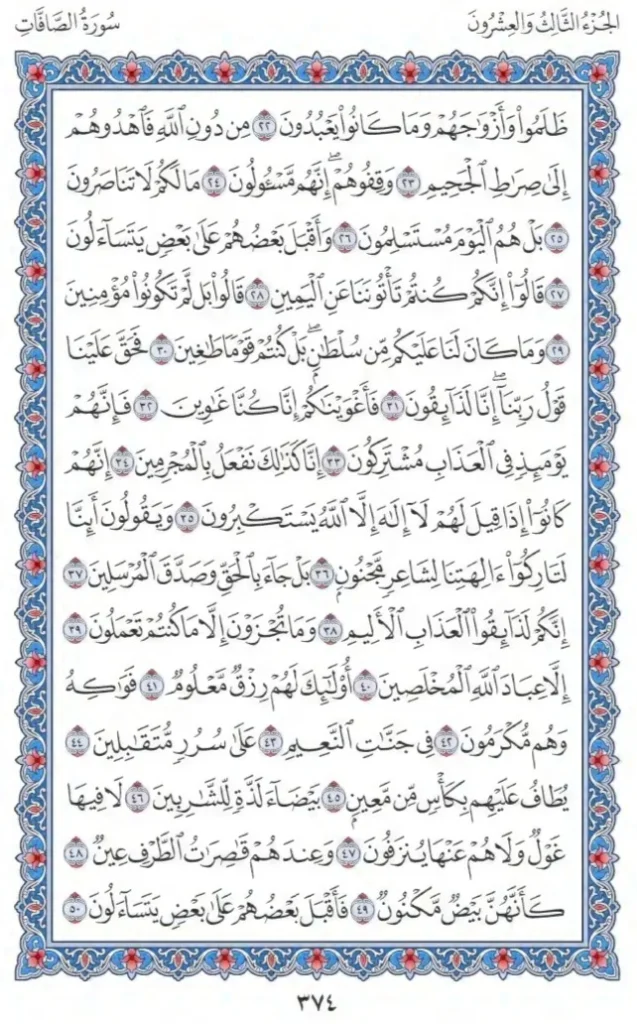Surah As Saffat: Summary & Lessons from Quran
| Classification | Meccan |
| Position | 37th Surah |
| No. of verses | 182 |
| No. of Rukus | 5 |
| No. of words | 865 |
| No. of letters | 3,724 |
Surah As Saffat Introduction:
Surah As Saffat ( الصافات) is the 37th chapter of the Qur’an. Its name comes from the word saffat meaning “those who are ranged in ranks” — referring to the ranks of angels. This Surah emphasizes the Oneness of Allah (Tawhid), the resurrection, prophethood, and the ultimate judgment. It contrasts the fate of believers and disbelievers and recounts stories of earlier prophets as lessons for people to reflect and reform.
Period of Revelation:
Surah As Saffat is a Makki Surah, revealed during the early period of the Prophet Muhammad ﷺ’s mission in Makkah. At that time, the Quraysh were deeply immersed in idol worship, denying resurrection, and ridiculing the idea of accountability. This Surah came as a strong response, emphasizing the Oneness of Allah, the certainty of the Hereafter, and the reality of Prophethood.
Purpose of Revelation:
The main purpose of Surah As Saffat is to affirm the truth of Tawheed (monotheism), reject shirk (polytheism), and highlight the certainty of resurrection. It describes the ranks of angels who worship Allah, refutes the false claims of the disbelievers, and recounts stories of earlier prophets such as Nuh, Ibrahim, and Yunus, showing how Allah supported them.
Themes:
1. The Surah opens by describing angels standing in ranks, worshiping Allah, and refuting the false claim that they are His daughters. It highlights that Allah is far above such associations.
2. The Surah directly addresses idol worshippers and their baseless beliefs, reminding them that creation itself testifies to Allah’s Oneness.
3. It affirms the reality of the Day of Judgment, vividly contrasting the eternal bliss of Paradise with the torment of Hell for the disbelievers.
4. The Surah recounts the struggles and victories of prophets such as Nuh, Ibrahim, Musa, Harun, Ilyas, Lut, and Yunus, illustrating patience, sacrifice, and Allah’s support for His messengers.
5. It reassures Muslims facing persecution that truth will prevail, just as it did in the past, and that Allah’s help is always near.
Sorah As Saffat Images:







FAQs
What does “As Saffat” mean?
It means Those who are arranged in ranks, referring to the angels lined up in worship and obedience to Allah.
Which prophets are mentioned in Surah As Saffat?
It mentions several prophets including Nuh, Ibrahim, Musa, Harun, Ilyas, Lut, and Yunus.
How does Surah As Saffat address polytheism?
It refutes idol worship, showing that angels are not gods but servants of Allah who obey Him in ranks.
What is the style of Surah As Saffat?
It uses oaths, vivid imagery, and short powerful verses, typical of early Makkan Surahs.
Why is Surah As Saffat significant for Muslims today?
It reminds Muslims of Allah’s Oneness, strengthens belief in the Hereafter, and inspires trust in Allah’s support just as He aided previous prophets.
What are the benefits of reading Surah As Saffat?
Reciting Surah As-Saffat strengthens belief in the Oneness of Allah, reminds the heart of resurrection and accountability, and inspires patience by recalling the struggles of past prophets. It brings comfort to believers in times of difficulty, protects from doubts about faith, and nurtures trust in Allah’s support. Spiritually, it elevates one’s connection with the Qur’an and increases reward in the Hereafter for those who recite it sincerely.
Author’s Quotation:
“Surah As Saffat is a stirring call to truth, vividly portraying the ranks of angels, the destiny of believers, and the downfall of falsehood. Its verses cut through the arrogance of disbelief and restore certainty in the Oneness of Allah and the reality of the Hereafter. By recalling the struggles of past prophets, it comforts the faithful and challenges the deniers. For the believer, Surah As-Saffat is both a shield of faith and a light guiding the path to salvation.”